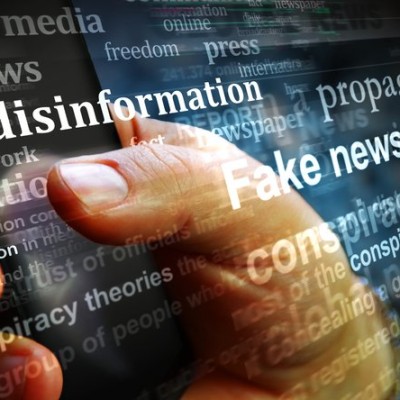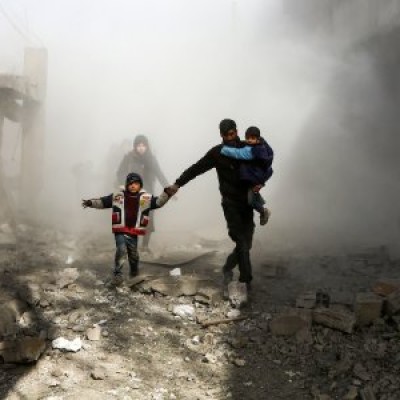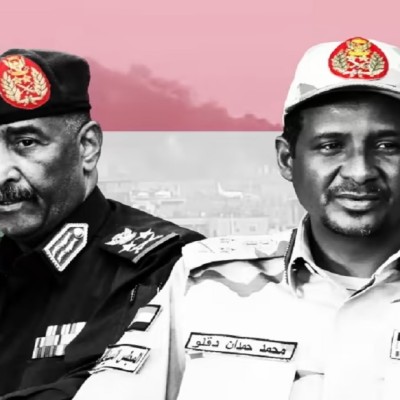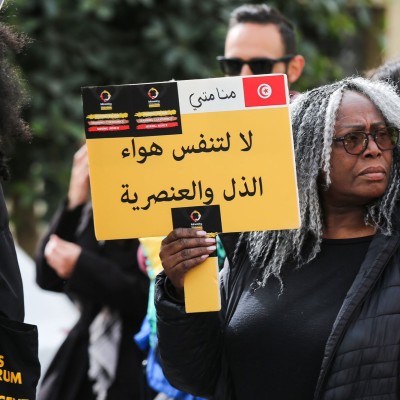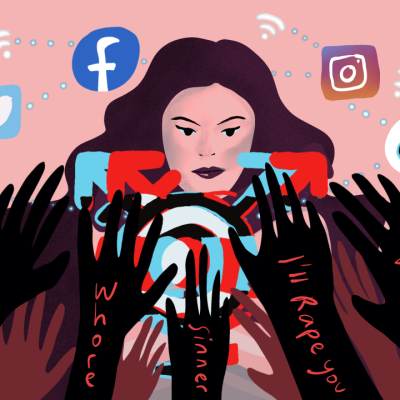LGBTQ+ Disinformation in Lebanon
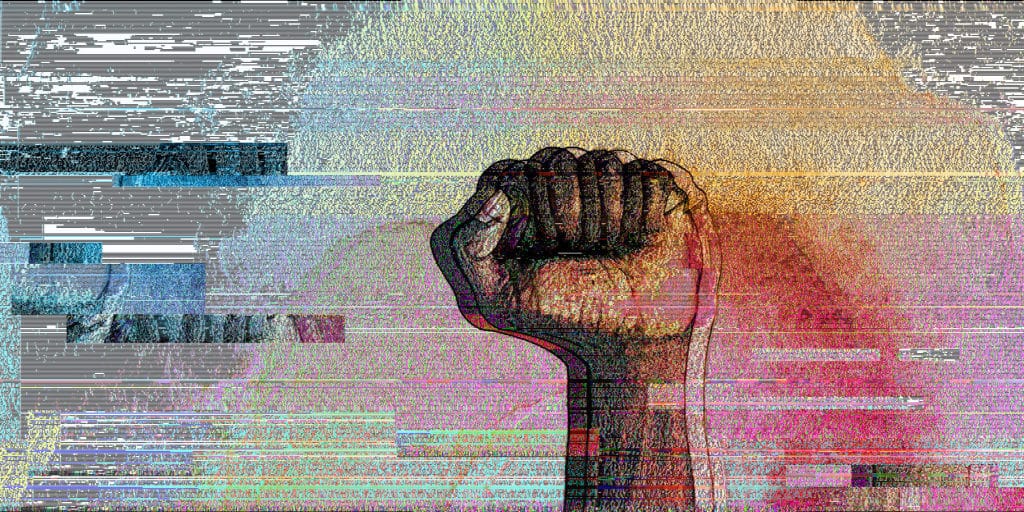
Nader Durgham
On August 23, 2023, a queer-friendly pub in Beirut’s Gemmayze neighborhood was attacked by members of a Christian extremist group known as the Soldiers of God (“Jnoud Al Rab” in Arabic). The attack marked a significant spike in anti-LGBT rhetoric and violence in Lebanon, once seen as a country showing relative tolerance of the community in the Arab region.
In the weeks leading up to the attack, anti-LGBT language dominated Lebanese social media spheres in levels unheard of in years. The atmosphere, in many ways, echoed the ongoing culture wars in the United States which heavily targeted LGBTQ+, and especially transgender people in the country. It also followed a trained of increasingly hostile attitudes against queer individuals across the Middle East.
The hostile online sphere targeting the LGBTQ+ community was most importantly boosted by Hassan Nasrallah, secretary general of powerful militant group Hezbollah, when he made a speech against the community in July of the same year. In that speech, Nasrallah claimed the spread of homosexuality was a “real danger” to Lebanon, and that individuals engaging in same-sex acts were “to be killed”.
In the weeks following this speech, Lebanese social media sphere were flooded with discourses surrounding the LGBTQ+ community, with many posts carrying hateful and inaccurate messages. The posts were not limited to supporters of Hezbollah or Jnoud Al Rab, but reached Lebanese officials, most notably the minister of culture Mohammad El Mortada.
Mortada became a particularly prominent figure in the weeks-long disinformation campaign, dedicating several tweets attacking the LGBTQ+ community and engaging with online arguments with those disagreeing with him.
The influence of the campaign lead to the Lebanese ministry of education removing the snakes and ladders board game from schools due to the presence of a rainbow on the board, and events tearing up rainbow-colored leaflets across the country.
Official-level discourse
While Lebanese politics are often mired with divisions, our investigation found a unity across sectarian and political lines regarding the spread of misinformation surrounding the LGBTQ+ community in Lebanon.
In certain, but not all aspects, the campaign was influenced by the recent Quran burnings in several countries in Europe. While the retaliatory protests to these moves mostly took place in Iraq, they also spread to other Arab and Muslim-majority countries. As several Western embassies in Middle Eastern countries gained notoriety for flying rainbow flags during events such as pride month or the International Day Against Homophobia, Biphobia and Transphobia, several protesters burned rainbow flags, viewing homosexuality as a Western construct and an infringement of their values.
Mortada, Lebanon’s culture minister, serves as a particularly prominent example of this case. He has previously accused the spread of homosexuality to be a Zionist and freemason plot. This comes in spite of several reports and content published by Palestinian queer organizations making a clear distinction between Israel’s image as an allegedly queer-friendly state, and the reality of occupation for queer Palestinians.
The minister, a Shia Muslim from the Hezbollah-allied Amal Movement party, shared a series of posts on X, formerly known as Twitter, discussing the opposition of Christianity to “sexual perversion,” and using Christian verses and art pieces to justify his active campaign against queer individuals.
Mortada went as far as comparing queer individuals to the devil, promoting the prospects of a “holy war” against them.
The minister asked for summer blockbuster movie “Barbie” to be banned in Lebanon, claiming it “promotes homosexuality and transgenders.” While the movie stars a trans actress, it makes no references or homosexuality or queerness in general. The country’s General Security Directorate then contradicted the minister’s claims by allowing the movie to be played in theaters.
Attempts to counter the heavily dominant anti-LGBTQ+ attitudes were also met with severe backlash and disinformation targeting pro-LGBT attitudes.
When Lebanese channel MTV released an advertisement calling for the decriminalization of homosexuality, the backlash reached the point of religious figures condemning the channel, and a high-ranking sheikh released a fatwa, or an Islamic ruling calling for the boycott of the channel.
Amidst this campaign, several Lebanese MPs proposed a draft law that would abolish article 534 of the Lebanese Penal Code. The article prohibits sexual acts seen as “unnatural,” but has often been used to prosecute having relations with partners of the same sex.
The draft was met with wide rejections and uproar from religious and political bodies. Many online users referred to the MPs as “representatives of sexual perversion” and specifically targeted MP Mark Daou, who was particularly vocal in favor of the queer community.
The disinformation targeting Daou even involved a fellow MP claiming Daou escaped homosexuality by getting married earlier in the summer.
Following the pressure campaign, one MP retracted his signature from the draft law.
Several Lebanese lawmakers also expressed their opposition to the draft law. Most notably, Mortada, as well as anti-Hezbollah MP Ashraf Rifi worked separate draft laws that further restricts any same-sex acts. Rifi’s draft also penalizes “anyone who promotes, facilitates, hides, or incites others.”
The widespread disinformation campaign was further exemplified by representatives from 40 media outlets in the country visiting the minister of culture, asking him to pursue his campaign against queer people.
“A diversion.”
Daou, along with several activists in Lebanon’s LGBTQ+ community, claimed the intensified disinformation campaign over the summer was used as a “diversion” from the country’s more pressing issues. Indeed, Lebanon is currently dealing with one of the world’s worst economic crises in modern history, with its elites still unable to agree over a course of action to resolve it.
Lebanon has been without a president since October of last year and is facing one of the highest inflation levels in the world. The deep divisions among its political and religious elites, which in many ways extended and sometimes even worsened the crisis, seemed to have been set aside temporarily as all parties agreed to attack the queer community in ways that are similar to the what the US has witnessed in terms of increased targeting of queer and trans individuals.
Indeed, Lebanese social media was flooded with video originating from the US attacking queer and, most notably, trans individuals.
A Lebanese beer commercial featuring sympathetic representation of queer individuals even garnered reactions that compared it to the US’ Bud Light controversy, where the American beer brand’s inclusion of a trans public figure in their ad campaign turned them into a pariah for conservative Americans.
Nasrallah dedicating significant time from a speech to discuss the “dangers” of homosexuality on Lebanese society further cemented the topic’s place in Lebanese public opinion over the summer.
Indeed, following his call to boycott any alleged promotion for sodomy or homosexuality, X users were quick to take pictures of any product that had a rainbow on it and exposed the stores selling them.
A woman even went viral after she accused a bakery of promoting homosexuality by selling a rainbow cake, causing the bakery to reply saying homosexuality does not align with its values.
Any sight of image of a rainbow therefore became a legitimate target in the eyes of many, believing it to be a promotion of homosexuality.
The Soldiers of God
Jnoud Al Rab were key elements of the weeks-long campaign targeting queer people in Lebanon. The group rose to prominence in 2019, when they threatened to attack a concert in Byblos by Lebanese indie band Mashrou’ Leila. The lead singer of the band, Hamed Sinno, is a gay man who was accused of offending Christian symbols in a Facebook post.
Jnoud al-Rab have since operated as an extremist Christian group in some areas of Beirut, with some politicians accusing them of operating in a militia-like manner. Detractors also refer to the group as the “Christian version of the Islamic State” (ISIS).
In June 2022, the group took down a rainbow-themed billboard in Beirut’s Achrafieh neighborhood. To them, the rainbow flag was a satanic symbol that needed to be rejected and condemned.
Quoting anonymous sources from inside the bank, Lebanese outlet l’Orient Le Jour reported that these men are part of SGBL bank owner Antoun Sehnaoui, a claim which spokespeople from the bank deny.
While the group claims to fight “Islamist peril,” often focusing on Palestinian and Syrian refugees, they have found themselves in an odd marriage with Shiite armed group Hezbollah in the campaign targeting the LGBTQ+ community.
The August 2023 attack was the most direct attack the group committed against their targets. The attack came a year after interior minister Bassam Mawlawi issued a directive for security forces to ban any pro-LBGTQ+ events. The directive, labeled by Human Rights Watch as unlawful, was suspended in November 2022 by a court order. Mawlawi therefore issued a second directive banning any events in relation to or even addressing homosexuality.
While the violence was condemned by several people, including politicians representing the affected neighborhoods of Gemmayze and Mar Mikhael, individuals and figures from different sectarian and political lines praised the attack. Mortada in particular said that Lebanon’s security forces should have stopped the event from taking place and shut down the venue.
While it is uncertain why the intense uptick in queerphobic discourse and violence took place, the general context of increased repression targeting queer individuals in the Middle East provides part of the explanation regarding its spillover in Lebanon. The use of queer individuals as “scapegoats,” as LGBTQ+ rights activists have accused officials of doing, would also be in line with previous campaigns targeting different vulnerable communities in the country, such as Syrian and Palestinian refugees.
